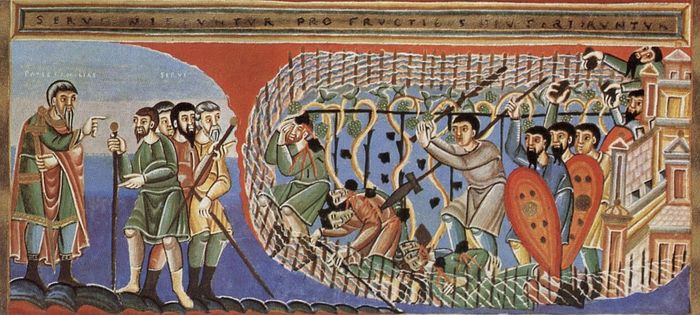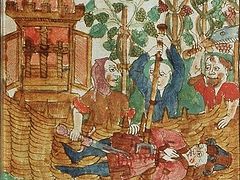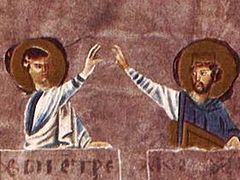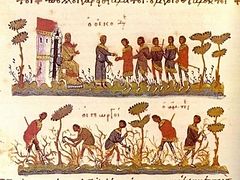Today we hear the parable of the vineyard. We are told that there was a man who planted the vineyard and along with this vineyard he built and provided everything that was necessary for the vineyard to thrive and do well.
He decided to allow tenant farmers to lease the vineyard and to work this land and take care of the vineyard. This was done with the understanding that one day they would bear fruit and share the fruit of the land with the owner. We are told that the season for fruit drew near and the owner of the vineyard sent servants to get the fruit. How did the tenant farmers treat the servants that came from the one who owned the vineyard and allowed them to work there? They took the servants and beat one of them, killed one of them and stoned another. Killing and stoning are both mentioned because stoning was a particularly shameful way to die and was usually reserved for those who had done wrong or committed transgressions according to some aspect of the Mosaic law.
How did the master of the vineyard respond to this? He sent even more servants in the hopes that he might get a different result. But it was no use. The result was the same. And finally the master decided to send his own son while he said to himself “They will respect my son.”
The Lord told this parable to teach the people and His own disciples about what was really happening around them. The Lord saw the religious authorities of the day, the Pharisees and Sadducees as the tenant farmers who worked the land that they did not themselves own. It was the land that they received in pristine condition, already built up with all that was necessary for the bearing of fruit. They received the law of Moses and the priesthood. They received the temple and all that was contained therein. They received the teaching of God. But none of that changed their disposition. In fact their disposition became worse. God had allowed them to work and serve in order that they might bear fruit. What was that fruit?
It was the fruit of repentance, which is love. The fruit would be seen in the changed lives of the people. The fruit would be seen in people who were brought from their old ways and directed towards love for God and their neighbors as well as the poor and suffering. But the tenants had nothing to give to the people because they didn’t first cultivate love for God and for their neighbors within themselves. In fact they so lacked love that they became hostile towards the Master who had allowed them to serve on His land and those whom He had sent to them, namely the holy prophets.
God began by sending His prophets to teach and warn and correct the people. Most of the prophets were not received with open arms but were driven away or killed. What was the message of the prophets? To cease from worshipping false idols and the things of the world and focus our lives on repenting, loving God and showing mercy to our neighbors and those in need.
Finally the Lord Jesus Christ begins to predict or foreshadow His own sufferings and death when He says in the parable that the master of the vineyard said “They will respect my son.” And of course they would have respected the son of the master had they been decent, good and upright people but they were not. They were corrupt to the core. Instead of looking at the son as a representative of the father, and treating him with utmost respect and gratitude for all that his father had done for them, they looked on the son with scorn and hatred. They said to themselves “This is the heir, come let us kill him and have his inheritance.” And so they took him and cast him out of the vineyard which was his birthright and they killed him.
All of this the Lord tells us in order to show us the reality of the situation. God sent His only begotten Son to us and He was treated shamefully and unjustly because of what He represented to the Pharisees and Sadducees as well as those in authority; a threat to their power and ability to rule over the people that God had given to them to care for. The problem is that these were not their people. They were God’s people. God taught and nurtured and loved His people throughout the ages in order to prepare them and bring them to Himself. Finally, when there was no other perfect way, in the fullness of time, Our heavenly Father sent His only begotten Son Jesus Christ to us. He did this knowing beforehand, that His Son would suffer just like the prophets did, but even worse. He would be hung shamefully, from a tree, the sign of one who is accursed according to the law. He was betrayed by the very people who should have embraced Him and venerated the very ground upon which He walked.
Our Lord tells us that the master of the vineyard will put those miserable men to death and will let out the vineyard to others who will give the fruit in due season. The apostles were given the priesthood of Jesus Christ, and have passed this down through the laying on of hands which has fallen to us. In this way, we who are responsible for the people of God are the tenant farmers and the vineyard is the Church. God the Father is the master who holds us accountable. It is not a lighthearted matter but a matter of spiritual life and death. My brother clergy and I will be held accountable for what we have taught and what we have failed to teach you. But most importantly we will be held accountable for whether or not we have taught you to truly love God and love your neighbor as if he is Christ in your midst.
Our Lord comes to each one of us every day. Sometimes He comes as a thought to pray. Sometimes He comes in the person who is needy or sick. Sometimes He comes to us in the word of the Scriptures and especially in the gospel. Sometimes He comes to us as bread and wine. But how do we receive Him? Do we cast him aside and live our own lives as we see fit? Do we crucify Him again by falling back into sin and rebellion? Or do we receive Him with open arms? Do we show Him honor and gratitude by bearing the holy fruit of love?
Nothing is more important in our lives than overwhelming love for God and for His Son. This love can be cultivated through intense prayer, and through the humble preparation for and participation in the holy mysteries as we do at every liturgy.
Our love is also cultivated through our love for others (but not just our friends and family). St. Maximos the confessor says “He he who does not love his neighbor fails to keep the commandment, and so cannot love the Lord.”
This is the foundation of all that we aim to do and this foundation of love is built upon the love of Jesus Christ for the whole world. Through this love, He who was the stone rejected by the builders became the headstone upon which our whole faith and Church have been built. To Him alone be the glory, dominion and worship with His Father and the Holy Spirit. AMEN.
Used with permission.





